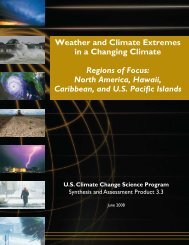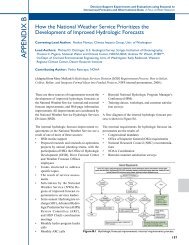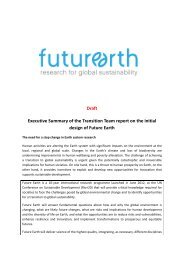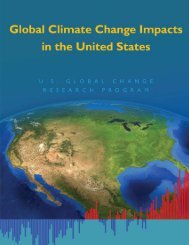Book 2.indb - US Climate Change Science Program
Book 2.indb - US Climate Change Science Program
Book 2.indb - US Climate Change Science Program
- No tags were found...
Create successful ePaper yourself
Turn your PDF publications into a flip-book with our unique Google optimized e-Paper software.
The U.S. <strong>Climate</strong> <strong>Change</strong> <strong>Science</strong> <strong>Program</strong>long-term changes. However, there is considerableuncertainty in the specific hydrologicresponse and its temporal and spatial pattern,owing to the auxiliary role that atmosphericcirculation patterns and antecedent conditionsplay in generating floods, and these factorsexperience interannual- and decadal-scalevariations themselves (Kunkel, 2003).These changes in the state of the atmosphere inturn lead to the somewhat paradoxical conclusionthat both extremely wet events (floods)and dry events (droughts) are likely to increaseas the warming proceeds (Kundzewicz et al.,2007, IPCC AR4 WG2 Ch. 3). The extremefloods in Europe in 2002, followed by theextreme drought and heatwave in 2003, havebeen used to illustrate this situation (Pal et al.,2004). They compared observed 20th-centurytrends in atmospheric circulation and precipitationwith the patterns of these variables (and ofextreme-event characteristics: dry-spell lengthand maximum 5-day precipitation) projectedfor the 21st century using a regional climatemodel, and noted their internal consistencyand consistency with the general aspects ofanthropogenic global climate changes.Projections of future hydrological trends thusemphasize the likely increase in hydrologicalvariability in the future that includes lessfrequent precipitation, more intense precipitation,increased frequency of dry days,and also increased frequency of extremely wetdays (Gutowski et al., 2008; CCSP SAP 3.3,Sec. 3.3.6). Owing to the central role of waterin human-environment interactions, it is alsolikely that these hydrological changes, andincreases in flooding in particular, will havesynergistic impacts on such factors as waterquality and the incidence of water-borne diseasesthat could amplify the impact of basichydrologic changes (Field et al., 2007, IPCCAR4, WG2, Ch. 14.4.1, 14.4.9). The great modificationsby humans that have taken place inwatersheds around the world further complicatethe problem of projecting the potential for futureabrupt changes in flooding.6.4 Assessment of Abrupt <strong>Change</strong> inFlood HydrologyAssessing the likelihood of abrupt changes inflood regime is a difficult proposition that iscompounded by the large range in temporal andspatial scales of the controls of floods, and theconsequent need to scale down the large-scaleatmospheric and water- and energy-balancecontrols and to scale up the hillslope- andwatershed-scale hydrological responses. Nevertheless,there is work underway to combine theappropriate models and approaches toward thisend (e.g., Jones et al., 2006; Fowler and Kilsby,2007; Maurer, 2007). This work could beenhanced by several developments, including:• Enhanced modeling capabilities. The attemptsthat have been made thus far toproject the impact of global climate changeon hydrology, including runoff, streamflow,and floods and low-flows, demonstrate thatthe range of models and the approaches forcoupling them are still in an early developmentalstage (relative to, for example,coupled Atmosphere-Ocean General CirculationModels). Sufficient computationalcapability must be provided (or made available)to facilitate development and use ofenhanced models.• Enhanced data sets. Basic data on theflood response to climatic variations, bothpresent-day and prehistoric, are required tounderstand the nature of that response acrossa range of conditions different from thoseof the present. Although human impacts onwatersheds and recent climatic variabilityhave provided a number of natural experimentsthat illustrate the response of floods tocontrols, the impact of larger environmentalChapter 3112






